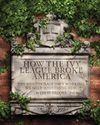
The question before the room was how much blood the banker should bleed. Mickey Down and Konrad Kay sat in an editing bay in Cardiff, Wales, scrutinizing footage from the third season of Industry, their HBO drama about the drug-addled, oversexed employees of a multinational financial firm. They'd paused on one particular shot of a character realizing that his nose had sprung a leak after much snorting of powders. The blood had been added digitally, and it fired down straight and steady from the character's nostril, like a burgundy laser beam.
The 35-year-old Down, wearing a Nike zip-up vest and thick tortoiseshell glasses, stroked his chin. The blood was looking a little too gruesome. "We just want it to be noticeable; it's a geyser at the moment," he said. A producer noted his feedback, and another unpaused the footage. The next shot revealed that the banker had been cradling a newborn baby in his arms and that the blood had splattered onto the infant's cheek.
The image, and the writers' matter-of-factness in discussing it, caused me to gasp. Down gave an apologetic chuckle. "We're sort of numb to it, aren't we?" he said. The 36-year-old Kay-the quieter and wryer of the two men-murmured, "It doesn't register." It referred to the depravity of Industry, a study of lethal greed and ambition transmitted from one generation to the next. When the series debuted in 2020, it followed a class of new hires at the London offices of Pierpoint, a fictional competitor to the likes of J. P. Morgan and Goldman Sachs. Young and diverse in race, sexuality, and class, the protagonists entered a century-old institution at which "culture change"-an attempt to build a kinder, more ethical workplacewas supposedly afoot. Rather than upending the system, however, the new hires proved quick studies at old-fashioned self-dealing and backstabbing.
Esta historia es de la edición September 2024 de The Atlantic.
Comience su prueba gratuita de Magzter GOLD de 7 días para acceder a miles de historias premium seleccionadas y a más de 9,000 revistas y periódicos.
Ya eres suscriptor ? Conectar
Esta historia es de la edición September 2024 de The Atlantic.
Comience su prueba gratuita de Magzter GOLD de 7 días para acceder a miles de historias premium seleccionadas y a más de 9,000 revistas y periódicos.
Ya eres suscriptor? Conectar

The Dark Origins of Impressionism
How the violence and deprivation of war inspired light-filled masterpieces

The Magic Mountain Saved My Life
When I was young and adrift, Thomas Manns novel gave me a sense of purpose. Today, its vision is startlingly relevant.

The Weirdest Hit in History
How Handel's Messiah became Western music's first classic

Culture Critics
Nick Cave Wants to Be Good \"I was just a nasty little guy.\"

ONE FOR THE ROAD
What I ate growing up with the Grateful Dead

Teaching Lucy
She was a superstar of American education. Then she was blamed for the country's literacy crisis. Can Lucy Calkins reclaim her good name?

A BOXER ON DEATH ROW
Iwao Hakamada spent an unprecedented five decades awaiting execution. Each day he woke up unsure whether it would be his last.

HOW THE IVY LEAGUE BROKE AMERICA
THE MERITOCRACY ISN'T WORKING. WE NEED SOMETHING NEW.

Against Type
How Jimmy O Yang became a main character

DISPATCHES
HOW TO BUILD A PALESTINIAN STATE There's still a way.